A-Z of news: The farming stories and events of 2019
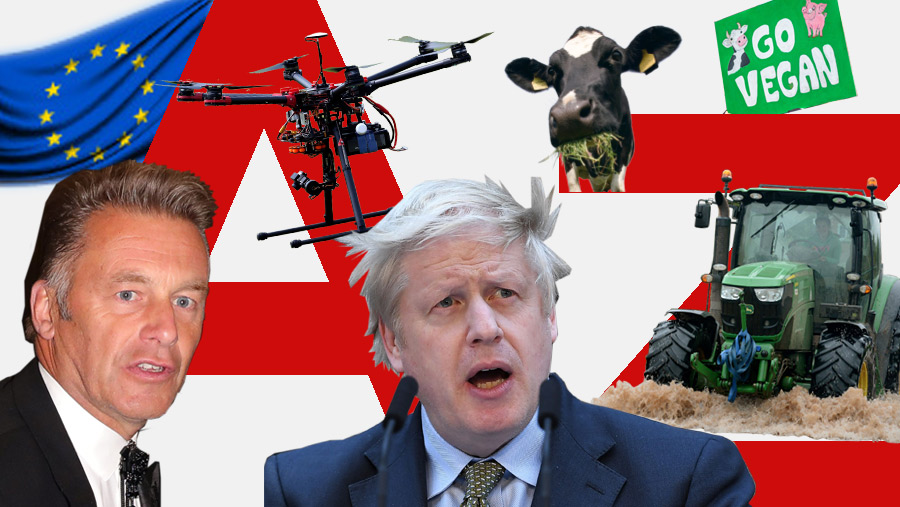
There is never a dull moment in agriculture, although the past 12 months have been particularly turbulent.
We take an alphabetical look back at some of the key stories that made up the farming year.
See also: All the latest farming news on FWi
A is for “ageing rock star”
In early October, renowned animal rights activist and Queen guitarist Brian May invited Farmers Weekly to his Save Me Trust headquarters in Surrey to share some of the work he has been involved with on bovine TB at Gatcombe Farm in Devon.
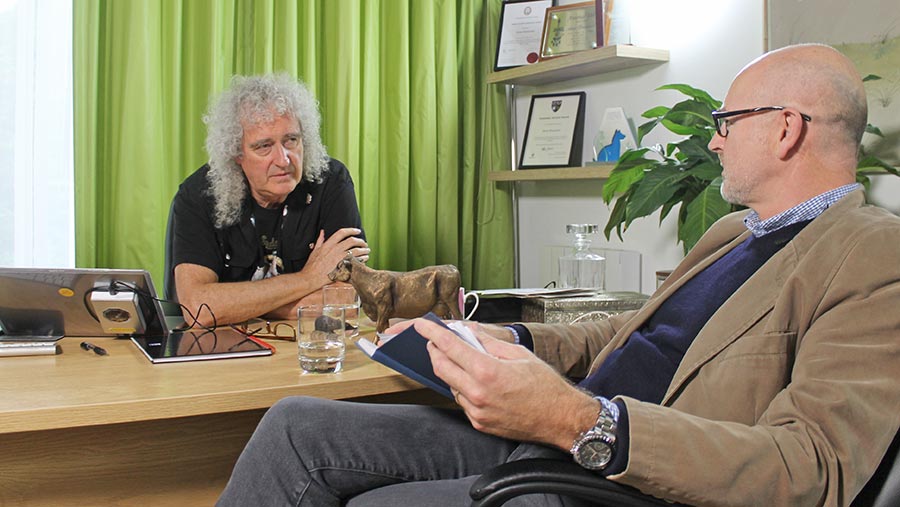
Brian May, left, with FWi executive editor Philip Clarke
By using a suite of advanced tests, the veterinary team led by Dick Sibley has identified animals that are not displaying signs of TB, but are shedding the bacteria in their dung.
This has led to a radical new approach, where these so-called “shedders” are removed from the herd and destroyed.
Overall hygiene standards have been tightened to minimise cow-to-cow transmission through faeces, for example by raising water troughs and taking slurry away to off-lying arable ground.
After six years of persistent TB breakdowns, Gatcombe was declared TB-free in March this year.
B is for “bang out of order”
Celebrity naturalist Chris Packham incurred the wrath of farmers, landowners and gamekeepers in March when he launched a legal challenge to the general licence for shooting crows and pigeons.
The complaint was that the general licences issued by Natural England were not rigorous enough in terms of requiring shooters to demonstrate that other, non-lethal alternatives had already been tried and failed.
Shooting was brought to a temporary standstill as Natural England first revoked the general licences, then replaced them with individual licences, before issuing new general licences with wording which it believed met the letter of the law.
But in June, Wild Justice issued a new legal challenge, saying the rewording did not go far enough.
A government consultation was launched inviting views which will help Defra devise new general licences for 2020.
C is for “Clarkson”
Jeremy Clarkson was photographed in August buying sheep at Thame market as he filmed for a new eight-part TV series. Due to screen next year, the series follows the Grand Tour presenter as he attempts to run his own 400ha working farm in Oxfordshire.
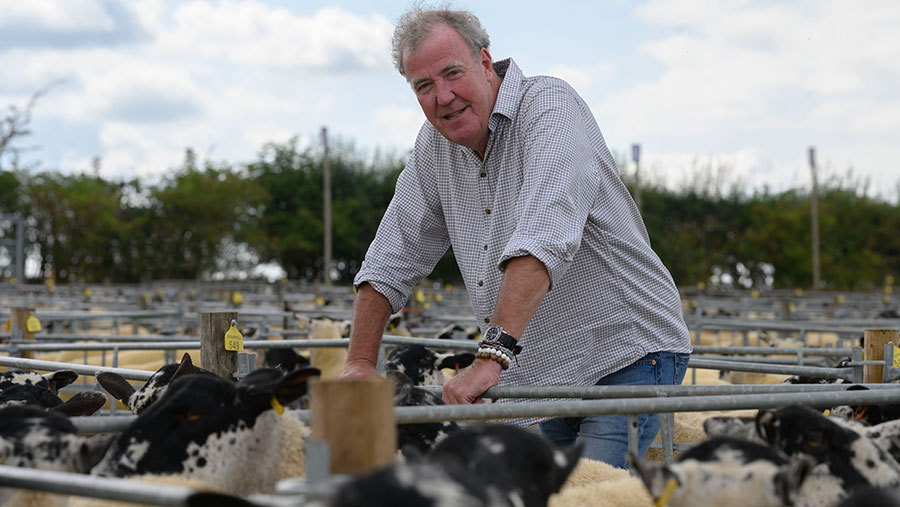
© I Bought the Farm
Producers say the series will have a serious underlying theme – but will also include “funny and entertaining bits”. It will document Mr Clarkson’s trials and tribulations as he strives to make the farm profitable.
A confessed “inept townie” with zero agricultural knowledge, Mr Clarkson joked: “Everything is going wrong. I don’t know how farmers don’t all have coronaries.”
D is for “danger”
A year-long campaign to reduce the number of workplace fatalities in agriculture was launched by the Farm Safety Partnership.
The campaign focused on four key areas where people are at risk; transport and machinery, falls from heights, working with livestock and keeping children safe on the farm.
The partnership involves more than 30 farming organisations, including Farmers Weekly.
Farmers and contractors were urged to turn off engines and apply the handbrake when leaving machinery – and use the hashtag #DriveSafetyForward on social media. They were also reminded to use safe working practices at height and when working with livestock.
The campaign’s goal is to halve the number of farm-related deaths within five years. But the number of fatalities remains stubbornly high.
E is for “Eat Lancet report”
The Eat-Lancet report hit the headlines in January with its controversial Planetary Health Diet.
Based on the global average daily intake of 2,370kcal, it suggested that human consumption of red meat and sugar needed to be cut by more than 50% to preserve the world’s resources and improve health.
Farmers and scientists were quick to criticise the report. They pointed out that it was based on global food production data and so was not relevant to the UK, where beef production and dairying are mainly grass-based.
A move to a plant-based diet in the UK would also mean a significant increase in imported food, much of it produced to lower environmental standards.
Nutritionist Zoe Harcombe from Cambridge University said the Planetary Health Diet would also leave people short of vitamins A, D and B12, and deficient in Omega-3 and calcium.
F is for “future farming”
UK farming is on the brink of a fourth agricultural revolution, with artificial intelligence, robotics and big data expected to transform the future of food production.
Dubbed Farming 4.0, it means agriculture needs to attract talent with the appropriate hi-tech skillsets to research, develop and operate a range of exciting new technologies.
More than 200 entrepreneurs, scientists and engineers gathered at Newcastle University’s Cockle Park Farm to watch a number of demonstrations featuring robots, drones and an autonomous vehicle that conduct soil tests.
The government’s agri-tech strategy aims to increase agricultural productivity by improving UK farming practices. Funded by a £90m investment and with four agri-tech centres, it is focusing on engineering, data, livestock and crop health.
Farmers Weekly was a key player at a more farmer-focused event later in the year, when the Future Farm Technology Expo brought hundreds of farmers and techies together at the Birmingham NEC.
G is for “glyphosate”
Germany announced plans to phase out the widely used herbicide glyphosate before introducing a total ban by the end of 2023.
But German growers warned that there were no effective substitutes for glyphosate and farmers would be forced to resort to older chemistry and more ploughing, which would be worse for the environment.
German agrochemical manufacturer Bayer CropScience is facing 42,700 compensation claims – mostly in the US – from plaintiffs blaming glyphosate for their cancers.
Bayer president Liam Condon said the company would defend the 40-year safety record of glyphosate in the courts.
Austria and France also announced plans to introduce a total ban by 2023.
EU authorities are due to re-evaluate glyphosate’s licence at the end of 2022. Until then at least, it remains available for growers to use in the UK.
H is for “harvest”
Harvest 2019 turned out to be a game of two halves. Despite a very soggy Cereals event in Lincolnshire in early June, the southern and eastern counties had a relatively easy time of it.
A dry growing season had threatened yields, but the reality was more positive, with barley, then wheat, coming off well.
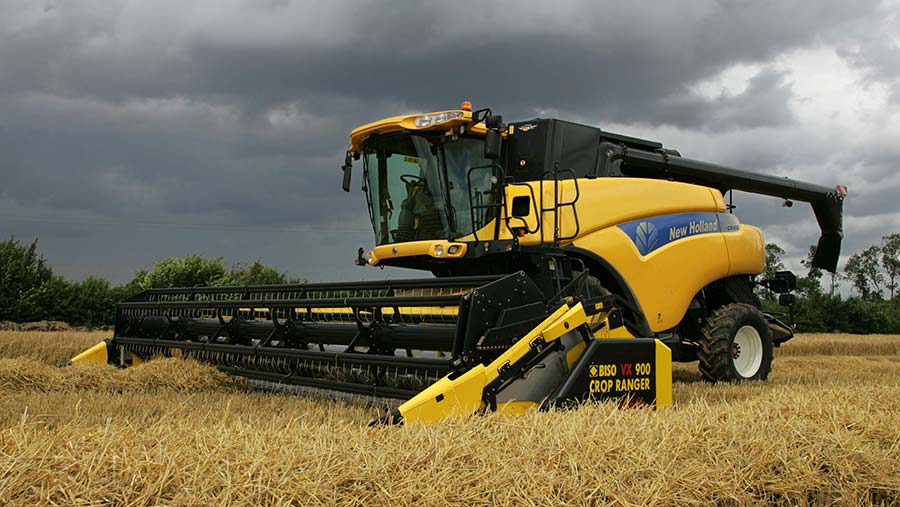
© Tim Scrivener
But things took a turn for the worse in mid-August, with rain showers initially holding up harvest, then threatening to ruin it the further north you went.
Scotland was especially hard hit, and by late August many crops were lying flat, the ground was too wet to travel on and some crops were sprouting. Yields and quality took a hit, while prices were at least £50/t lower than a year earlier.
Combined with higher drying costs, the result will be squeezed margins for many arable farmers in the north of the country.
I is for “inspections”
The Health and Safety Executive ramped up farm inspections in an effort to improve the industry’s poor health and safety record.
Agriculture accounts for 20% of reported work-related deaths each year – despite employing only 1.2% of the workforce.
The HSE said it didn’t want to catch people out – but genuinely wanted more people to understand what a safe farm looks like.
It said inspectors would be visiting farms to remind farmers of their duty to protect themselves, their workers and the public.
Farmers who refused to take appropriate measures would face enforcement, it added.
In 2018-19 there were 32 deaths as a result of injuries sustained in agricultural work – three more than the average of 29 deaths each year since 2014-15.
Being struck by a moving vehicle (25%), injured by an animal (17%) and falling from height (16%) were the most common causes.
J is for “junk”
Shocking levels of junk dumped illegally on farms were recorded in 2019 – with each incident costing the farm an average of £1,000 to clean up.
Piles of old fridges, ripped sofas, tyres, washing machines, building rubble and household waste dumped illegally in our countryside remain a widespread problem.
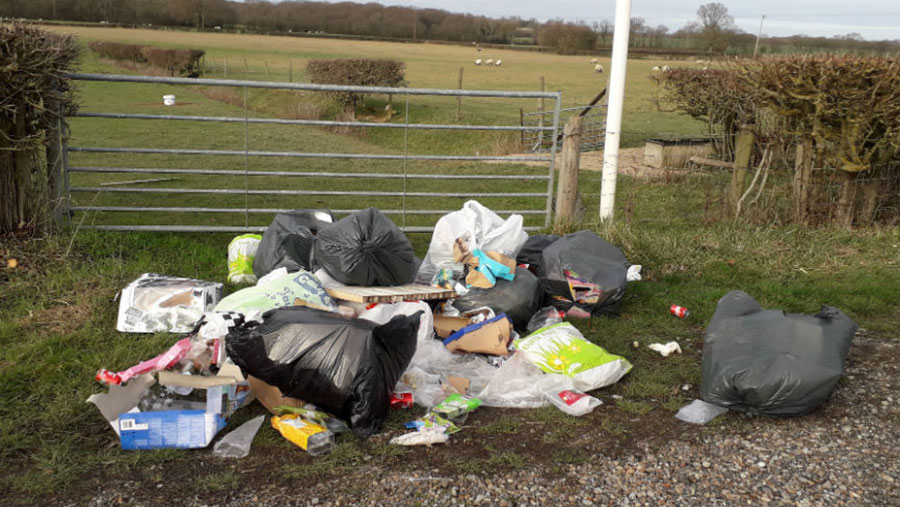
Waste fly-tipped in Criol Lane © Asford Borough Counci
Farming organisations including the CLA, NFU, Tenant Farmers’ Association and the Countryside Alliance continued to lobby the government to change the law, which requires private landowners to pay for the “privilege” of removing someone else’s junk.
According to the CLA, only one in 600 fly-tipping offences is prosecuted and the average penalty meted out is less than £430.
K is for “Kate”
The Duchess of Cambridge (above) roared with laughter as she sheared a sheep during a visit to a Cumbrian farm in June.
Kate bravely tried her hand at shearing, helped by farmer Jack Cartmel, but her husband Prince William joked afterwards that the ewe “is not going to be happy with her haircut”.
The royal couple also tried herding a flock of Herdwick and Swaledale sheep and dry stone wall building at Deepdale Hall Farm in Patterdale.
They sat down to tea and cakes with the Brown family to discuss Brexit and other issues affecting farming.
L is for “lock and key”
Farmers have been fighting back against the rural crime wave this year by turning their properties into fortresses.
In April, a survey by Farmers Weekly of more than 550 farmers revealed that nine out of 10 were victims of rural crime at least once a year, with 41% suffering an incident at least once a month.
Two-thirds of respondents were dissatisfied with the way police handle rural crime locally, but more than eight in 10 said police powers were insufficient and courts were failing to hand out appropriate penalties.
Leicestershire farmers and agricultural contractors David and Jim Saunders told how they had turned their yard at Fields Farm, Sutton Cheney, into a fortress to protect their assets.
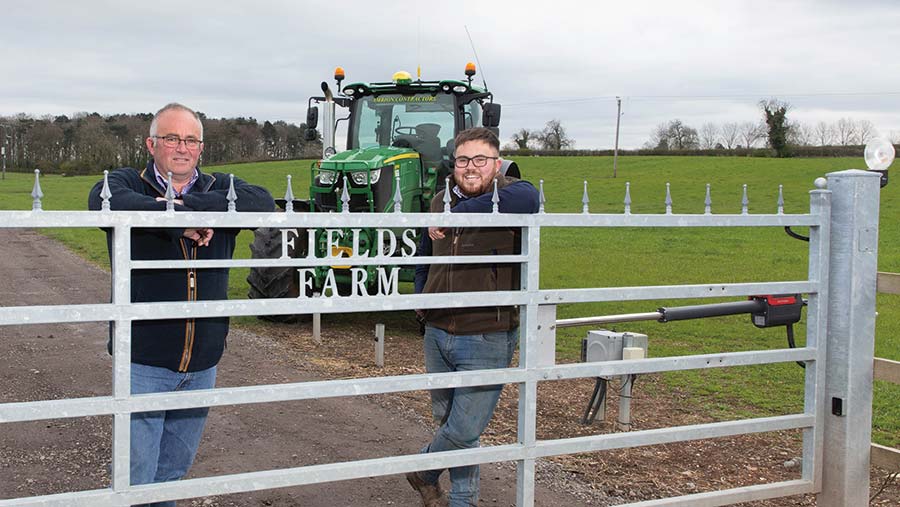
The father and son partnership have spent about £27,000 on security over the past two-and-a-half years, including CCTV cameras, an electronic gate at the main entrance and a tracking system that protects all 19 major machinery items.
M is for “myth buster”
The BBC incurred the wrath of farmers in late November with a documentary called Meat: A Threat to our Planet?
Highlighting the environmental damage caused by livestock production in the US and Brazil, the programme suggested the UK industry was almost as culpable.
Farmers Weekly took the opportunity to challenge some of the claims made in the programme and to explain how UK grass-based beef production is entirely different.
In particular, the BBC said livestock produced more greenhouse gases than transport, basing this claim on a now-discredited 2006 FAO report.
Even the FAO now says livestock is responsible for just 5% of greenhouse gas emissions globally, compared with 14% for transport. In the UK, the figures are 4.5% and 27%, respectively.
N is for “naked farmer”
Norfolk farmer Patrick Joice, who died in September aged just 46, helped change farmers’ lives for the better by raising thousands of pounds for charity – and increasing awareness of mental health issues in agriculture.
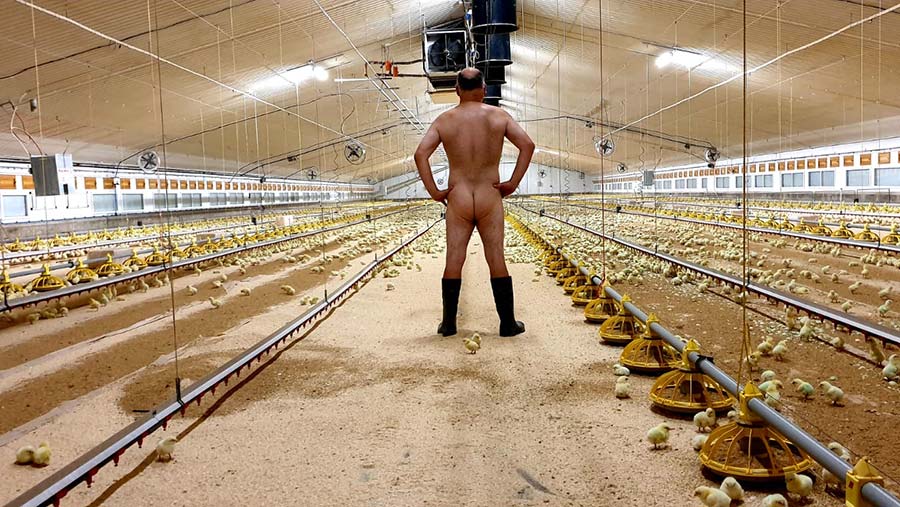
After being told he had terminal cancer in 2018, Patrick was subsequently diagnosed with severe depression – a condition he initially refused acknowledge. “I thought people with depression just needed a good kick up the backside – including me,” he said.
He stumbled across the Naked Farmer Facebook page, which aims to break the stigma of mental health in agriculture.
Patrick wrote his own story and shared it publicly with a photo of himself, naked but for his wellies, in one of his poultry sheds.
The response was huge, inspiring others to open up about their own struggles with depression, stress and anxiety.
In the weeks before he died, Patrick was named Farmers Weekly 2019 Farming Champion of the Year.
O is for “ow much?”
Many in farming saw prices under pressure in 2019, but none more so than the beef sector.
The price slide actually started the previous autumn, but week by week the value of finished cattle tumbled, reaching rock bottom in the third week of October, when the GB average hit 321p/kg dw, leaving many producers losing money on their stock.
At their peak in September 2018, they were closer to 386p/kg dw.
Reasons for the decline included an imbalance of supply and demand, stockpiling ahead of the supposed Brexit date of 29 March, an influx of frozen imports and a relatively poor barbeque season. An £87m handout to Irish beef producers didn’t help.
The pressure culminated in a special crisis meeting at the Royal Welsh Show in July, where the four main farming unions presented a five-point turnaround plan.
Prices finally turned the corner in November, but remain weak.
P is for “pride”
Fifty members of the farming community took a tractor, resplendent in rainbow colours, and marched through Brighton to celebrate inclusiveness in the sector.
The group walked with the rainbow-coloured Massey Ferguson tractor – nicknamed “Sassey Ferguson” – and were among 300,000 people at Brighton Pride on 3 August.
Their involvement was organised by Agrespect, a UK-wide organisation set up by farmers which supports LGBTQ+ people living and working in rural communities.
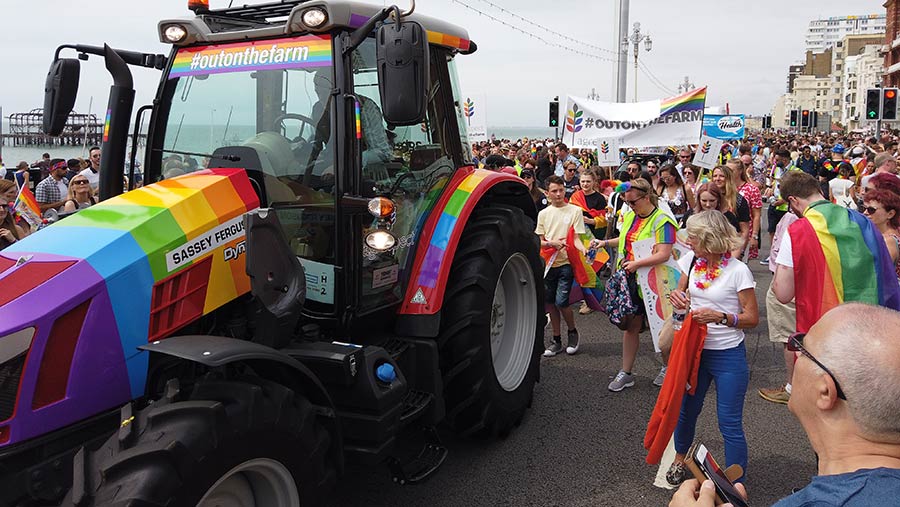
© Oli Hill/Proagrica
Q is for “quagmire”
The wettest autumn in memory saw crops rotting in the fields, winter cereals left undrilled and farmland under water.
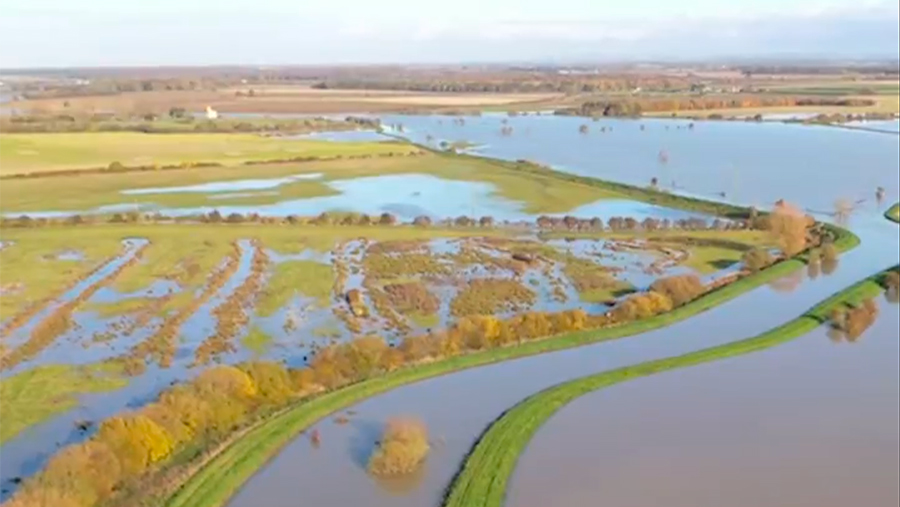
At Short Ferry, near Stainfield, Lincolnshire, flood-hit farmer Henry Ward had to wait three weeks before the Environment Agency started repairing a breach in the Barlings Eau watercourse that had left his farm accessible only by boat.
Mr Ward said it was right that protecting homes and people should take priority – but farmers should be properly compensated for storing water on their land.
He added: “This is having a big impact on our business and it simply can’t carry on – we’ve lost a year’s cropping.”
Earlier in the summer, farmers in the Yorkshire Dales were left counting the cost of flash floods that washed away soil, destroyed bridges, drowned livestock and ruined feedstuffs.
R is for “reshuffle”
It was a year of reshuffles. Yorkshire farmer Robert Goodwill served for just 143 days as Defra farm minister following the resignation of George Eustice, who said he could no longer serve in Theresa May’s government due to differences over Brexit.
Come-back kid Mr Eustice was later reappointed to the post by prime minister Boris Johnson in a government reshuffle after Mrs May herself resigned.
The same reshuffle saw Defra secretary Michael Gove leave the department to be replaced by Theresa Villiers.
S is for “staffing”
Visa delays meant many workers from overseas were unable to take up jobs on UK farms this summer.
With the busy harvest period approaching in May, the NFU warned of a 20% shortfall in the number of seasonal workers required.
NFU horticulture board chairman Ali Capper said the government’s pilot Seasonal Workers Scheme – which aimed to allow 2,500 temporary workers into the UK – was failing to alleviate labour shortages.
The NFU called for the scheme to be extended from 2,500 places to 10,000. In response, the government said EU nationals would be allowed to live and work in the UK – even in the event of a no-deal Brexit.
As the general election approached, the Conservative government promised a fourfold expansion in the number of migrant farmworkers that would be allowed into the UK from outside the EU in 2020, taking it from 2,500 to 10,000.
T is for “Trumpism”
Prospects of a possible free-trade deal with the US post Brexit occupied minds for much of the year, with farmers concerned that Donald Trump’s “America first” approach would hit their businesses.
Despite assurances from government ministers that the UK would demand “equivalence of standards” on any future imports of US food, the powerful US food lobby has been very active in pushing for full market access for their chlorine-washed chicken and hormone-implanted beef.
A US trade negotiating paper was published in March, seeking to eliminate practices that unfairly decrease US market access opportunities or distort agricultural markets”.
Further evidence of President Trump’s desire to secure access for US farm goods emerged in November, when leaked papers from earlier trade talks showed the US putting pressure on the UK to lower its food standards.
U is for “university”
The UK is home to some of the best universities and colleges in the world to study agriculture – and many were recognised for their excellence this year.
Reading University was rated the best UK university for agriculture and forestry, and ranked 9th in the world – the only UK university in the top 50.
The universities of Nottingham, Aberystwyth, Aberdeen, Newcastle, Exeter and Queen’s University Belfast were among the top 150 in the list.
V is for “vegans”
Tensions between the farming community and vegan activists ran high this year, with farmers facing harassment and threats to their families and businesses from those with anti-meat and dairy agendas.
In August, magistrates in Poole handed vegan activist Emma Christoforakis a two-year restraining order after she carried out a series of harassment incidents against Wimborne farmer John Wood between February and October 2018.
Mr Wood told of the emotional toll after mother-of-three Ms Christoforakis, 37, branded him and his wife “murderers” and “animal abusers”.
Farmers hit back with the second annual #Februdairy campaign, which promoted the benefits of dairy across social media platforms.
W is for “world records”
British farmers like to think of themselves as “the best in the world” – and when it comes to shearing sheep and growing oilseed rape, it seems they are.
In late September, Jonny Roberts and Martin Howlett smashed the eight-hour sheep shearing record at Bigley Farm, near Salisbury, Wiltshire, getting through 1,075 ewes in the allotted time.
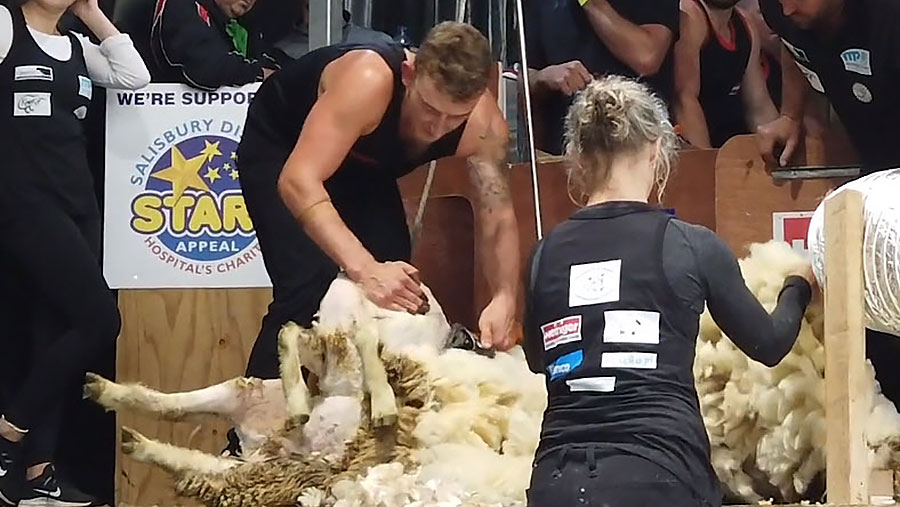
On completing the record, Mr Howlett told Farmers Weekly: “I’m sure once the pain subsides it will all be worth it.”
Requiring less physical exertion, but just as much skill, Kent grower Richard Budd achieved an unofficial world record for oilseed rape, with a crop of 7.19t/ha in the Yield Enhancement Network (Yen) competition.
Late drilling, high sunlight hours and regular tissue testing were the keys to his success.
X is for “X factor”
The Farmers Weekly awards, now in their 15th year, celebrated the best of the best in October, with more than 1,100 farmers and industry stakeholders attending “farming’s biggest party” at the swanky Grosvenor House Hotel in London.
The overall Farmer of the Year title went to Bedfordshire farm manager Andrew Robinson, in recognition of an amazing technical performance, as well as his work in motivating staff and hosting farm visits.

© Telling Photography
The Lifetime Achievement Award went to Caroline Drummond, chief executive of Leaf (Linking Environment and Farming), while the coveted Farming Champion was Nigel Joice, who sadly passed away just a few days before the Awards night (see “N is for Naked farmer”).
Y is for “Yo-yo”
Figures for bovine TB go up and down all the time, and the trend continued in 2019.
A study assessing the effects of four years of badger culling found a reduction in new TB herd breakdowns in the Gloucestershire and Somerset cull zones of 66% and 37%, respectively, after four years (2013 to 2017).
The NFU said the figures in the peer-reviewed, scientific report were “conclusive evidence” that culling badgers was working to reduce bovine TB.
But a Freedom of Information request to Defra revealed some contrasting figures.
Between 2017 and 2018 in the Gloucestershire zone, the number of new herd incidents rose from 16 to 28, an increase of 75%.
And the proportion of herds that had their officially TB-free herd status withdrawn (OTFW) rose from 10 to 23 – an increase of 130% on the previous year.
In the year to August a record 12,799 cattle were slaughtered in Wales because of bovine TB – a 28% increase year on year.
This prompted Welsh farming unions NFU Cymru and the Farmers’ Union of Wales to renew their calls for the Welsh government to introduce a badger cull.
Comparable figures for England showed a 1% drop – to 33,223 from 32,793 the previous year.
Z is for “Zzzzz… Brexit fatigue
Will it be third time lucky (or unlucky, depending on your stance) as the UK once again tries to leave the European Union next month?
Does anyone really care anymore? Or are most farmers tired of the whole thing – seemingly suffering like the rest of the country from Brexit fatigue?
The original “exit day” was 11pm on 29 March 2019. Then it was delayed until 11pm on 31 October 2019 – before being postponed again until 11pm on 31 January 2020.
But, following the conclusive result of the general election on 12 December and the formation of a majority Conservative government, this now seems likely to finally happen.
